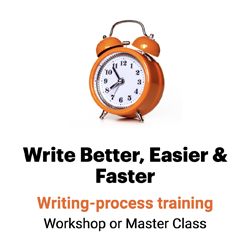Take a walk, take a nap, take a break in this 3rd step
Novelist Agatha Christie believed that the best time to write was while washing the dishes.

Author Harper Lee did much of her creative thinking while golfing. And artist Grant Wood said, “All of the really good ideas I ever had came to me while I was milking a cow.”
Welcome to the wonderful world of incubation. That’s the third step of the 5-step creative process — the one where you take your eye off the ball and let the back of your mind work on your project for awhile. Then comes the miraculous moment when your brain presents a brilliant idea fully formed — aka the eureka or aha! moment.
Where did that brilliant idea come from? I don’t know. It’s all part of the magical and mysterious juju of the creative process.
Incubation works.
For decades, creative personalities have reported that their thought processes include … doing nothing.
Richard Feynman, the Nobel Prize-winning physicist, preferred the relaxed atmosphere of … ahem … a topless bar. There, he would drink 7 Up, enjoy the entertainment and, if inspiration struck, doodle equations on cocktail napkins.
The French call it l’esprit de l’escalier — the wit of the staircase. That’s when you think of a great idea on your way out of the brainstorming meeting or the perfect retort the day after someone makes a snarky remark.
Want to bring your creative ideas to life? Take a tip from creativity research: Unlock your creative potential by putting away the conscious work and opening your mind to the aha! moment.
1. Time it right.
That’s forage, analyze, then take a break. Incubation is the third step of the creative process.
My writing time is much more effective if I research and organize information the day before I write. The next day, I’m itching to get started. The reason: 16 hours of down time have really been 16 hours of incubation.
Kenneth Atchity, author of A Writer’s Time, calls this phenomenon “creative pressure.” You put off that first draft until you can hardly stand it any more, until you can’t wait to get to the keyboard and let off some of that creative steam.
But incubate before you’ve foraged and analyzed (preparation incubation), and you don’t have anything to incubate on. Don’t let incubation become procrastination. (My brother, the famous comic book artist, substitutes a rhyming word for procrastination here.)
2. Sleep on it.
Russian chemist Dmitri Mendeleev reportedly established the periodic table of elements after waking from a dream one afternoon. British poet Samuel Taylor Coleridge claimed that “Kubla Khan” came to him in a dream.
You might come up with better ideas if you got more sleep, too.
German scientists have demonstrated that our brains continue to work on problems while we sleep. After eight hours of rest, they’re more likely to come up with the right solution.
Other research shows that the best way to keep your brain working is to get outside and move.
However you accomplish it, the incubation effect requires not working on the project at hand.
3. Multitask your way to incubation.
Don’t have time to sleep — let alone hit a topless bar — while a deadline is looming?
Instead of taking a break, move on to a new project. Forage and analyze Project A, for example, then forage and analyze Project B. While your conscious mind tackles Project B, your subconscious will be problem-solving on Project A.
Stuck? Don’t plow through. The best approach may well be to move on.
Learn more about why multitasking works, in this TedTalk.
Incubation insights.
Incubation may be the most misunderstood — and, therefore, the most frustrating — part of the creative process. That’s because it seems as if you aren’t really doing anything.
To Western eyes (and Western bosses) that can look a little … well … lazy. But the cost of going full bore on a project without a break can actually be creativity — even productivity itself.
So take a tip from creative individuals, and don’t skip this important stage of idea generation. Take a walk, take a nap, take a break — or just switch projects.
“Break,” says creativity expert Matthew May, “is the most important part of breakthrough.”
____
Sources: Jonah Lehrer, “The Eureka Hunt,” The New Yorker, July 28, 2008
William McCall, “Learn While Dreaming: Sleep Essential for Creative Thinking, Sharper Memories,” Associated Press, Jan. 21, 2004

Leave a Reply